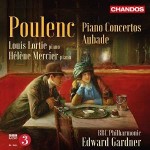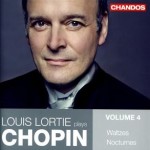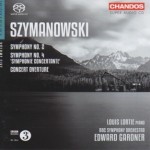

There have been a lot of new recordings of Saint-Saëns inventive and always enjoyable piano concertos recently, but this series featuring Louis Lortie and Edward

This is a clever and attractive coupling: music for solo(s) and orchestra, including voices, nicely diverse and organized so as to make an intriguing complete

Chopin’s Mazurkas and Polonaises may be nationalistic in origin, yet their musical impact is universal. They also seem to withstand a wide range of interpretive

Is it really true that Fauré’s piano music is too intimately scaled and harmonically refined to make an impact in large halls? Louis Lortie’s first

This disc is as beautifully planned as it is played and engineered. The two Saint-Saëns cello concertos are superb pieces–succinct, shapely, melodically memorable, passionate and

The small pieces for multiple pianists added as encores–the tiny Sonata for Piano Four-Hands, Élégie for Two Pianos, and L’Embarquement pour Cythère–add to this disc’s

The fourth volume of what promises to be a complete Chopin piano music survey from Louis Lortie contains five nocturnes and the 19 waltzes. Lortie

Hearing this disc, you get a clear sense that neither conductor nor orchestra knows this music very well. The playing is never less than professional,

Louis Lortie’s survey of the complete Années de Pèlerinage adds up to his finest Liszt playing on disc. The interpretations abound with new-found reserves of

Here’s a Franck D-minor Symphony in the classic French tradition of Paray and Munch: fast and exciting. In fact, at less than nine minutes, Tortelier’s
![]()
